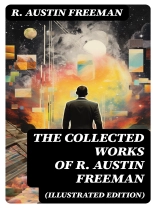The Collected Works of R. Austin Freeman (Illustrated Edition) offers a comprehensive look at the pioneering contributions of one of the foremost figures in the detective genre. This collection features Freeman’s groundbreaking short stories and novels, notably introducing his iconic detective, Dr. John Thorndyke, a forerunner of the forensic crime solver. Freeman’s literary style is marked by meticulous attention to detail, scientific reasoning, and a strong narrative voice, making his work a precursor to contemporary forensic novels. The illustrated edition enriches the experience, providing visual contexts that enhance the storytelling and evoke the period’s atmosphere, reflecting the Edwardian era’s preoccupations with science and rationality. R. Austin Freeman, born in 1862, was a medical doctor and an avid advocate of scientific advancement, which profoundly influenced his writing. His background in medicine and commitment to logical deduction allowed him to infuse his stories with an authentic spirit of inquiry and analysis. Freeman’s unique blend of academia and creative narrative reflects the transitional literature of the early 20th century, showcasing a shift towards integrating scientific principles within popular fiction. This illustrated edition is a must-read for enthusiasts of the detective genre and scholars alike, as it vividly encapsulates the transitional essence of mystery writing. Freeman’s works not only entertain but also challenge readers to engage with the scientific method, making this collection an invaluable addition to any literary library.
关于作者
Dr. Richard Austin Freeman (1862–1943) was an esteemed British writer of detective stories, mostly known for his character Dr. John Thorndyke. A pioneer in the forensic crime genre, Freeman’s literary contributions extend beyond merely crafting engaging mysteries; they reflect a deep-rooted interest in the scientific methodologies of crime detection, which he integrated with classic elements of deductive reasoning and suspense. A medical practitioner by training, Freeman brought an authenticity to his tales that was somewhat rare for his time. This is evident in his careful attention to the details of both the legal intricacies and the scientific facts that became a hallmark of his work. His rich storytelling is encapsulated in ‘The Collected Works of R. Austin Freeman (Illustrated Edition)’, which showcases his mastery of plot and the thoroughness of his background research. Freeman is noted for his invention of the ‘inverted detective story, ‘ a format in which the commission of the crime is described at the outset, typically including the identity of the perpetrator, with the story then describing the detective’s attempt to solve the mystery. His works delve into early forensic science with an authority that presaged modern crime-solving techniques, leaving an indelible mark on the detective fiction genre. In light of his significant contributions, Freeman remains a respected figure among the pantheon of crime fiction writers, valued as much for his individual literary style as for the ingenuity of his story construction.












